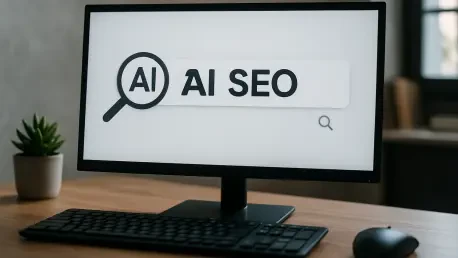Imagine a world where traditional search engines no longer dictate online visibility, and instead, artificial intelligence synthesizes answers directly from vast pools of data, reshaping how content is discovered and consumed in the digital realm. This is the reality digital marketing faces today as the shift from Search Engine Optimization (SEO) to Generative Engine Optimization (GEO) accelerates, driven by AI-powered tools like ChatGPT and Google Gemini. These technologies are not just enhancing search; they are fundamentally altering it by prioritizing synthesized responses over direct links, challenging marketers to rethink strategies that have been staples for decades. The urgency to adapt cannot be overstated, as agencies and businesses risk obsolescence if they fail to align with this transformative wave. This article delves into the critical pivot from SEO to GEO, exploring why this change matters, the strategies needed to thrive, and the broader implications for the digital landscape in an AI-dominated era.
Redefining Search in the AI Era
The emergence of AI-driven search engines marks a profound departure from the mechanics of traditional SEO, where keywords and backlinks once reigned supreme. Now, generative engines prioritize natural language processing and structured data to deliver conversational, synthesized answers rather than a list of links. This shift demands a new approach to content creation, where the focus is on ensuring information is not just discoverable but also citable by AI models. Industry reports suggest that platforms leveraging AI are becoming the new gatekeepers of visibility, pushing marketers to optimize for algorithms that value clarity, authority, and relevance over sheer volume of links. Agencies must now grapple with the reality that failing to adapt could mean losing ground in a landscape where AI dictates the rules of engagement, making it essential to understand the nuances of this technology.
Beyond the technical overhaul, the transition to GEO reflects a broader change in user behavior and expectations, as people increasingly seek instant, personalized responses from search tools. This means content must be crafted to align with conversational queries, often requiring a blend of storytelling and factual precision to stand out in AI-generated results. Early adopters in competitive markets have already seen tangible benefits, with increased organic traffic and higher engagement rates reported by those who have embraced these tactics. The challenge lies in balancing creativity with technical optimization, ensuring that content resonates with both human audiences and machine algorithms. As AI continues to evolve, staying ahead of these trends will be crucial for maintaining relevance in a rapidly changing digital environment.
Strategies for Thriving with GEO
Adapting to GEO requires a strategic rethink, starting with the integration of traditional SEO strengths with new AI-focused techniques to maximize visibility. This hybrid approach involves using structured data and schema markup to make content easily retrievable by generative engines, while still maintaining core SEO practices like mobile responsiveness and site speed. The goal is to create a seamless user experience that appeals to both AI systems and human readers, enhancing brand recognition in personalized search results. Industry experts emphasize the importance of authoritative sourcing and statistic integration, as these elements boost the likelihood of content being cited by AI tools, thereby increasing trust and credibility. This dual focus represents a powerful opportunity for agencies to redefine their digital presence.
Equally important is the need to establish thought leadership in the AI search space, a move that can set agencies apart in a crowded market. This involves consistent content creation that showcases expertise through case studies, in-depth analysis, and actionable insights tailored for AI consumption. Beyond content, technical foundations such as prompt engineering and subquery optimization are critical to ensuring information is interpreted correctly by generative models. The investment in training and tools to support these efforts cannot be ignored, as the learning curve for GEO can be steep. However, the rewards of early adoption are evident in markets where agencies have already seen improved click-through rates, proving that proactive adaptation can yield significant competitive advantages in this new era of search.
Challenges and Opportunities Ahead
Navigating the shift to GEO is not without its hurdles, as the resource demands and complexity of AI optimization present significant challenges for many agencies. The need to overhaul existing content strategies, invest in new technologies, and upskill teams can strain budgets and timelines, particularly for smaller firms with limited capacity. Additionally, the risk of obsolescence looms large for those who ignore the nuances of AI-driven search, as generative engines continue to reshape how information is prioritized and delivered. Warnings from industry outlets highlight that without a cultural shift toward innovation, businesses may struggle to keep pace with competitors who are already leveraging these tools to capture market share. The stakes are high, and the pressure to adapt is immediate.
Yet, within these challenges lie transformative opportunities for those willing to embrace change and redefine their approach to digital marketing. By positioning themselves as authorities in AI search, agencies can guide clients through uncharted territory, building trust and loyalty in the process. The potential to amplify brand visibility through personalized, conversational results offers a unique chance to connect with audiences on a deeper level. Success stories from early adopters demonstrate that blending GEO with traditional tactics can drive measurable results, from higher engagement to increased organic reach. As the digital landscape evolves, the ability to innovate and lead in this space will distinguish the winners from those left behind, making it imperative to act decisively in the face of this technological revolution.
Building a Future-Ready Framework
Reflecting on the journey from SEO to GEO, it became evident that the digital marketing landscape had reached a pivotal moment where adaptation was no longer optional but essential for survival. Agencies that took bold steps to integrate AI-driven strategies with established practices often found themselves ahead of the curve, reaping rewards in visibility and engagement. The path was not always smooth, as the steep learning curve and resource demands tested even the most prepared teams. Yet, those who committed to innovation and thought leadership carved out a space as trusted guides in an AI-dominated search environment, setting a precedent for others to follow.
Looking ahead, the next steps involved a sustained focus on building robust frameworks that could withstand the rapid pace of technological change. Prioritizing continuous learning and investment in tools for AI optimization emerged as critical actions to maintain competitiveness. Collaborating with industry peers to share insights and best practices also offered a way to navigate future uncertainties. By embedding flexibility into content strategies and fostering a culture of experimentation, businesses positioned themselves to not only survive but lead in the generative search era, ensuring they remained relevant as the digital frontier continued to expand.









